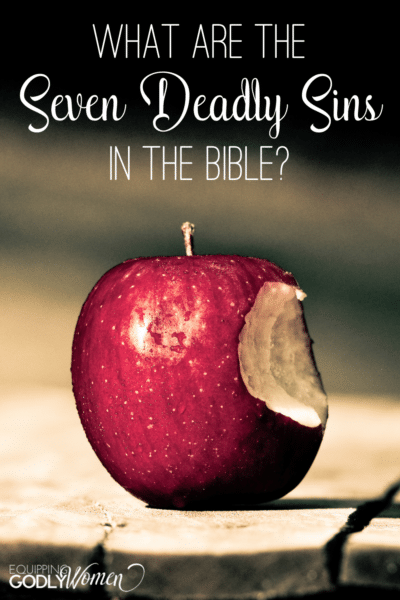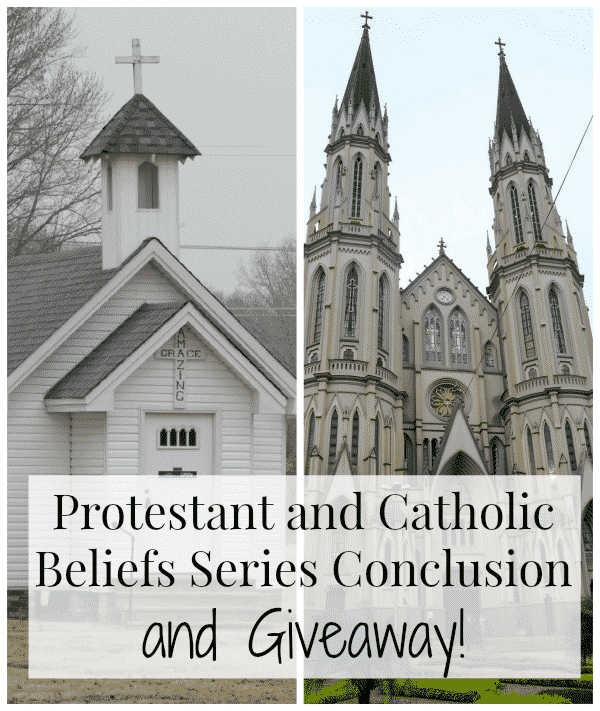What are the Seven Deadly Sins (Capital Sins) in the Bible?
From Dante’s Inferno in the 14th century to the movie Shazam in 2019, the seven deadly sins (or capital sins) have been part of popular Western culture for centuries.
They’re the subject of numerous movies (such as Se7en) and TV series (including 7 Deadly Sins, the 2014 documentary, and The Seven Deadly Sins, the 2014 anime series)… not to mention countless books and articles.
With all this attention, you might be surprised to learn that the seven deadly sins aren’t in the Bible — at least, not as a complete list.
The good news is: If you’re wondering, “What are the seven deadly sins?” you’re in the right place.

In this article, we’re answering the question “What are the seven deadly sins” and exploring how history, popular culture, and religious texts including the Bible have shaped the seven deadly sins (capital sins) as we know them today. We’ll answer questions including:
What Are the Seven Deadly Sins (in Order)?
The seven deadly sins are: pride, greed, lust, envy, gluttony, wrath, and sloth.
Also known as “capital sins” or “cardinal sins,” these seven sins are a group of vices that are considered to cause all other sins. Each sin represents a core human failing that can lead to further wrongdoing.
Some Christians believe these particular sins could lead to or result in the “death of the soul.” In other words, committing these sins and not confessing them could result in eternal damnation.
Whereas I believe Scripture is abundantly clear that blasphemy of the Holy Spirit is the only unforgivable sin, Christians who adhered to the concept of the seven deadly sins in earlier centuries believed that committing these seven sins could result in losing one’s salvation.
Where Are the Seven Deadly Sins in the Bible?
The seven deadly sins aren’t in the Bible… at least, not as a group. You won’t find the terms “seven deadly sins” or “seven capital sins” in Scripture, nor will you see them all listed together as a set. The Catechism of the Catholic Church does include a very similar list of sins, called the seven capital sins, which are essentially the same thing.
However, while Scripture doesn’t list the seven deadly sins together, the Bible does have a great deal to say about each of the seven deadly sins individually.
1. Pride
Pride, the first deadly sin, involves having an elevated view of self and seeing oneself as more important than others. Those who created this list saw pride as the “over-arching ruler” of the other sins, meaning that all other sins can stem from pride.
Scripture is clear that the Lord hates pride (Proverbs 8:13), yet this is a sin that I believe all of us struggle with at some point in our lives.
When we are selfish, it’s because we see ourselves as more important than others. If we take out our anger on others, it’s because we believe our emotions are more important than theirs. If we are lazy, making others pick up our slack, it’s because we believe our time is more valuable than theirs.
Some of the most popular Bible verses that mention the sin of pride include:
- Psalm 10:4: “In his pride the wicked man does not seek him; in all his thoughts there is no room for God.”
- Psalm 101:5: “Whoever slanders their neighbor in secret, I will put to silence; whoever has haughty eyes and a proud heart, I will not tolerate.”
- Proverbs 8:13: “To fear the Lord is to hate evil; I hate pride and arrogance, evil behavior and perverse speech.”
- Proverbs 11:2: “When pride comes, then comes disgrace, but with humility comes wisdom.”
- Proverbs 13:10: “Where there is strife, there is pride, but wisdom is found in those who take advice.”
- Proverbs 16:18: “Pride goes before destruction, a haughty spirit before a fall.”
- Proverbs 21:4: “Haughty eyes and a proud heart—the unplowed field of the wicked—produce sin.”
- Proverbs 29:23: “Pride brings a person low, but the lowly in spirit gain honor.”
- James 4:6: “But he gives us more grace. That is why Scripture says: ‘God opposes the proud but shows favor to the humble.'”
- I John 2:16″ “For everything in the world—the lust of the flesh, the lust of the eyes, and the pride of life—comes not from the Father but from the world.”
2. Greed
Greed, also called avarice, is the second deadly sin. The sin of greed involves the desire to accumulate more and more wealth or worldly possessions.
I think greed is another insidious sin that tricks us into thinking we don’t struggle with it, but, especially in today’s social-media-fueled culture, it’s hard not to compare our lives to others and want what they have–at least at times. Living in America, we all have so much, and yet we always want more, more, more.
Some of the most popular Bible verses that mention the sin of greed include:
- Proverbs 28:25: “The greedy stir up conflict, but those who trust in the Lord will prosper.”
- Ecclesiastes 5:10: “Whoever loves money never has enough; whoever loves wealth is never satisfied with their income. This too is meaningless.”
- Jeremiah 6:13: “From the least to the greatest, all are greedy for gain; prophets and priests alike, all practice deceit.”
- Luke 12:15: “Then he said to them, ‘Watch out! Be on your guard against all kinds of greed; life does not consist in an abundance of possessions.'”
- 1 Corinthians 5:11: “But now I am writing to you that you must not associate with anyone who claims to be a brother or sister but is sexually immoral or greedy, an idolater or slanderer, a drunkard or swindler. Do not even eat with such people.”
- Colossians 3:5: “Put to death, therefore, whatever belongs to your earthly nature: sexual immorality, impurity, lust, evil desires and greed, which is idolatry.”
- Hebrews 13:5: “Keep your lives free from the love of money and be content with what you have, because God has said, ‘Never will I leave you; never will I forsake you.'”
3. Lust
Lust, the third deadly sin, involves an insatiable desire for something that is not yours.
In today’s popular culture, most people think of sexual lust when imagining the sin of lust. However, lust encompasses much more than sensuality and sexual desire in the context of Scripture and throughout history as well. We can also lust after possessions, money, attention from others, etc.
In this context, it’s a misnomer to assign lust as being primarily a “man’s sin,” as we’ve seen often happen in church culture. When looking at lust as being an insatiable desire for something we do not own, it can be something that both sexes struggle with equally.
Some of the most popular Bible verses that mention the sin of lust include:
- Proverbs 6:25: “Do not lust in your heart after her beauty or let her captivate you with her eyes.”
- Romans 1:24-27: “Therefore God gave them over in the sinful desires of their hearts to sexual impurity for the degrading of their bodies with one another. They exchanged the truth about God for a lie, and worshiped and served created things rather than the Creator—who is forever praised. Amen. Because of this, God gave them over to shameful lusts. Even their women exchanged natural sexual relations for unnatural ones. In the same way the men also abandoned natural relations with women and were inflamed with lust for one another. Men committed shameful acts with other men, and received in themselves the due penalty for their error.”
- Colossians 3:5: “Put to death, therefore, whatever belongs to your earthly nature: sexual immorality, impurity, lust, evil desires and greed, which is idolatry.”
- 1 John 2:16: “For everything in the world—the lust of the flesh, the lust of the eyes, and the pride of life—comes not from the Father but from the world.”
4. Envy
Envy, the fourth deadly sin, involves being jealous of someone else’s possessions or success.
While we may all desire what others have as fleeting thoughts now and then, envy is consumed by it. This is why taking our thoughts captive is essential, so we don’t succumb to sins of the mind like jealousy.
Some of the most popular Bible verses that mention the sin of envy include:
- Proverbs 14:30: “A heart at peace gives life to the body, but envy rots the bones.”
- Proverbs 27:4: “Anger is cruel and fury overwhelming, but who can stand before jealousy?”
- Ecclesiastes 4:4: “And I saw that all toil and all achievement spring from one person’s envy of another. This too is meaningless, a chasing after the wind.”
- 1 Corinthians 3:3: “You are still worldly. For since there is jealousy and quarreling among you, are you not worldly? Are you not acting like mere humans?”
- Galatians 5:19-21: “The acts of the flesh are obvious: sexual immorality, impurity and debauchery; idolatry and witchcraft; hatred, discord, jealousy, fits of rage, selfish ambition, dissensions, factions and envy; drunkenness, orgies, and the like. I warn you, as I did before, that those who live like this will not inherit the kingdom of God.”
- James 3:14-16: “But if you harbor bitter envy and selfish ambition in your hearts, do not boast about it or deny the truth. Such “wisdom” does not come down from heaven but is earthly, unspiritual, demonic. For where you have envy and selfish ambition, there you find disorder and every evil practice.”
5. Gluttony
Gluttony, the fifth deadly sin, involves overindulging in food, alcohol, or other activities.
Many modern Christian churches skim over gluttony and, instead, focus sermons on lust, greed, envy, and some of the other sins, as gluttony has become more acceptable, especially in American culture.
I challenge us to all become more aware of how gluttony may have a stronghold in our lives. Just because this sin has become acceptable in the United States doesn’t make it any less of a sin in the eyes of God.
Some of the most popular Bible verses that mention the sin of gluttony or the concept of gluttony include:
- Deuteronomy 21:20: “They shall say to the elders, ‘This son of ours is stubborn and rebellious. He will not obey us. He is a glutton and a drunkard.'”
- Proverbs 23:20-21: “Do not join those who drink too much wine or gorge themselves on meat, for drunkards and gluttons become poor, and drowsiness clothes them in rags.”
- Proverbs 25:16: “If you find honey, eat just enough—too much of it, and you will vomit.”
- Philippians 3:19: “Their destiny is destruction, their god is their stomach, and their glory is in their shame. Their mind is set on earthly things.”
6. Wrath
Wrath, also called rage and the sixth deadly sin, involves outbursts of anger. Scripture is full of examples of righteous anger (Mark 3:1–5; Matthew 21:12–13; Luke 19:41–44), but the sin of wrath occurs when one sins in other ways while angry, such as hitting someone out of anger.
Some of the most popular Bible verses that mention the sin of wrath include:
- Proverbs 14:29: “Whoever is patient has great understanding, but one who is quick-tempered displays folly.”
- Galatians 5:19-21: “The acts of the flesh are obvious: sexual immorality, impurity and debauchery; idolatry and witchcraft; hatred, discord, jealousy, fits of rage, selfish ambition, dissensions, factions and envy; drunkenness, orgies, and the like. I warn you, as I did before, that those who live like this will not inherit the kingdom of God.”
- Ephesians 4:26-27: “’In your anger do not sin’: Do not let the sun go down while you are still angry, and do not give the devil a foothold.”
- Ephesians 4:31-32: “Get rid of all bitterness, rage and anger, brawling and slander, along with every form of malice. Be kind and compassionate to one another, forgiving each other, just as in Christ God forgave you.”
- James 1:19-20: “My dear brothers and sisters, take note of this: Everyone should be quick to listen, slow to speak and slow to become angry, because human anger does not produce the righteousness that God desires.”
7. Sloth
Sloth, the seventh deadly sin, is the sin of laziness. Scripture gives many examples of God rewarding the diligence of hard workers as well as examples of those who are lazy reaping the consequences of their slothfulness.
Some of the most popular Bible verses that mention the sin of sloth include:
- Proverbs 18:9: “One who is slack in his work is brother to one who destroys.”
- Proverbs 21:25: “The craving of a sluggard will be the death of him, because his hands refuse to work.”
- Ecclesiastes 10:18: “Through laziness, the rafters sag; because of idle hands, the house leaks.”
- Matthew 25:26: “His master replied, ‘You wicked, lazy servant! So you knew that I harvest where I have not sown and gather where I have not scattered seed?”
- 2 Thessalonians 3:10: “For even when we were with you, we gave you this rule: ‘The one who is unwilling to work shall not eat.'”
Where Do the Seven Deadly Sins Come From?
What we now call the seven deadly sins began as the eight evil thoughts in the fourth century. A Christian monk, Evagrius Ponticus, wrote this list intending to name eight sins that can hinder someone’s thoughts and spiritual practices.
The eight evil thoughts varied slightly from today’s seven deadly sins and included gluttony, lust, avarice (another word for greed), anger, sloth, sadness, vainglory, and pride. Ponticus’s list adds sadness (not a sin) and vainglory (an elevated version of pride) but omits greed.
The sins have taken on several different iterations over the centuries before becoming the official seven deadly sins we’re familiar with today. History.com expounds on how Pope Gregory I and the theologian Thomas Aquinas later essentially edited the list until the final version, which aligns with Aquinas’s.
What are the Seven Capital Sins (Catholic)?
The Catechism of the Catholic Church lists seven capital sins: pride, avarice (greed), envy, wrath, lust, gluttony, and sloth. The seven capital sins and the seven deadly sins are the same thing.
Vices can be classified according to the virtues they oppose, or also be linked to the capital sins which Christian experience has distinguished, following St. John Cassian and St. Gregory the Great. They are called “capital” because they engender other sins, other vices. They are pride, avarice, envy, wrath, lust, gluttony, and sloth or acedia. — The Catechism of the Catholic Church (CCC 1866).
Do you think these seven deadly sins are more dangerous than others? Why or why not?






